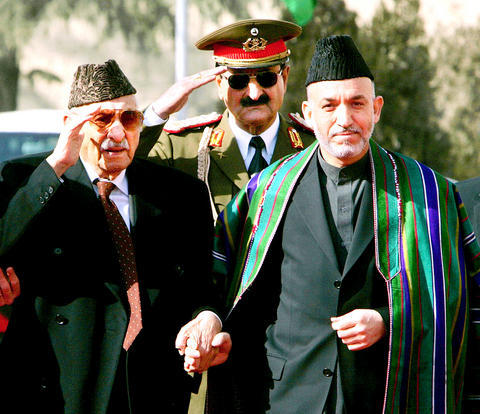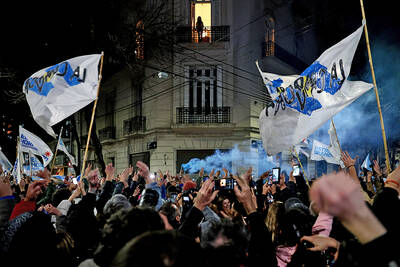Former king Mohammad Zahir Shah, whose 40-year reign until his exile in 1973 coincided with one of the most peaceful periods in Afghanistan's recent history, died yesterday at his Kabul home, aged 92.
"We announce three days of national mourning over the death of the father of the nation, and the Afghan flag will be at half mast for three days," Afghan President Hamid Karzai told reporters at a press conference.
"Prayer ceremonies will be held across the country, in the capital, in the provinces, by Afghan refugees overseas and in Afghan embassies," he said.

PHOTO: AP
State TV interrupted its normal broadcast and a woman dressed black with a black headscarf announced Zahir Shah had died. Prayers and recitals from the Koran followed.
Zahir Shah ruled Afghanistan from 1933 until he was deposed by his cousin in 1973. He lived in exile in Italy before returning home as an ordinary citizen in 2002, but was accorded the honorary title "father of the nation."
"When I saw the mountains of my country, my people, my friends -- what is better that this," he said shortly after his return. "I wish just to be able to do things for my country and serve it."
Zahir Shah came from a long line of ethnic Pashtun rulers and is a distant relative of Karzai.
Born in Kabul on Oct. 15, 1914, Zahir Shah received part of his education in France and returned to Kabul for military training. He ascended the throne in 1933 after his father was assassinated by a deranged student.
For two decades, the bookish king remained in the shadows, allowing three uncles to run the government. But he gradually gained in confidence and took full control in 1953, overseeing a cautious modernization.
He supported an end to purdah -- the wearing of the veil -- for women, used foreign cash to develop the country's medieval infrastructure and managed to keep a balance between rival Soviet and Western interests.
In 1973, while holidaying in Italy, Zahir Shah was ousted in a bloodless coup orchestrated by his cousin and brother-in-law, Prince Daoud, ending two centuries of rule by the Durrani dynasty.
Daoud was later killed in a coup and after Soviet troops entered the country in 1979 to prop up the communist government, Afghanistan has barely seen peace.

LANDMARK CASE: ‘Every night we were dragged to US soldiers and sexually abused. Every week we were forced to undergo venereal disease tests,’ a victim said More than 100 South Korean women who were forced to work as prostitutes for US soldiers stationed in the country have filed a landmark lawsuit accusing Washington of abuse, their lawyers said yesterday. Historians and activists say tens of thousands of South Korean women worked for state-sanctioned brothels from the 1950s to 1980s, serving US troops stationed in country to protect the South from North Korea. In 2022, South Korea’s top court ruled that the government had illegally “established, managed and operated” such brothels for the US military, ordering it to pay about 120 plaintiffs compensation. Last week, 117 victims

China on Monday announced its first ever sanctions against an individual Japanese lawmaker, targeting China-born Hei Seki for “spreading fallacies” on issues such as Taiwan, Hong Kong and disputed islands, prompting a protest from Tokyo. Beijing has an ongoing spat with Tokyo over islands in the East China Sea claimed by both countries, and considers foreign criticism on sensitive political topics to be acts of interference. Seki, a naturalised Japanese citizen, “spread false information, colluded with Japanese anti-China forces, and wantonly attacked and smeared China”, foreign ministry spokesman Lin Jian told reporters on Monday. “For his own selfish interests, (Seki)

Argentine President Javier Milei on Sunday vowed to “accelerate” his libertarian reforms after a crushing defeat in Buenos Aires provincial elections. The 54-year-old economist has slashed public spending, dismissed tens of thousands of public employees and led a major deregulation drive since taking office in December 2023. He acknowledged his party’s “clear defeat” by the center-left Peronist movement in the elections to the legislature of Buenos Aires province, the country’s economic powerhouse. A deflated-sounding Milei admitted to unspecified “mistakes” which he vowed to “correct,” but said he would not be swayed “one millimeter” from his reform agenda. “We will deepen and accelerate it,” he

Japan yesterday heralded the coming-of-age of Japanese Prince Hisahito with an elaborate ceremony at the Imperial Palace, where a succession crisis is brewing. The nephew of Japanese Emperor Naruhito, Hisahito received a black silk-and-lacquer crown at the ceremony, which marks the beginning of his royal adult life. “Thank you very much for bestowing the crown today at the coming-of-age ceremony,” Hisahito said. “I will fulfill my duties, being aware of my responsibilities as an adult member of the imperial family.” Although the emperor has a daughter — Princess Aiko — the 23-year-old has been sidelined by the royal family’s male-only